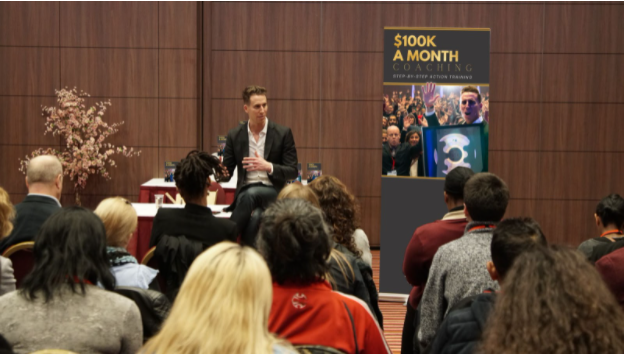Lifestyle
My Personal Brand Is My Biggest Sales Generator, says Suicide Survivor Ed JC Smith

Scaling up a business means learning how to automate systems, having a team of people who manage the back end of your business, and having a good understanding of all aspects of sales and marketing. But ultimately it comes down to you and the quality of the product you are selling.
Ed JC Smith is one of the biggest success stories in the world of coaching and has created a community of thousands who must first qualify as coaches before they start the business of building their client base and spreading the word about their services.
Ed takes his coaches through all of this and shows them how he has done it so they can emulate his success.
“I began as a fitness trainer, or toilet cleaner I like to say, working at a local gym. I’d failed miserably at school and my life was pretty sad as well. I tried to throw myself in front of a train at 13, only to be dragged back at the last moment by a homeless man.
Looking back now it’s hard to see that shattered teenager. Ed is a softly spoken Englishman yet his words carry weight. He has educated himself in business, sales, and marketing as well as mastering the tools he needs for his business, but at heart he is a coach, it’s all he’s ever done.
“Coaching is a very rewarding career. I’ve studied psychology, various healing modalities from NLP (Neuro-Linguistic Programming) to philosophy and business. I’ve dabbled in investments that ended badly and helped build 3 charities, but mostly I love being able to help people,” says Ed from his home in the UK.
My Brand Is Me

Ed is now in demand as a speaker and he has published 3 books and created 22 courses, but he is not one to stand back and let his body of work speak for him. He remains front and center of the coaching community he has built.
“People want to know who you are. I regularly record videos that go up on my social media sites, I am available to my coaches throughout their courses, my brand is me and that’s important for people to know,” he says.
Ed tells his coaches that the most important thing they have to offer is their life experience, it’s more important than anything, and if they plan to scale up their businesses, and this is part of what Ed teaches his coaches, they will also have to create their own brand.
Part of Ed’s strategy is a very simple one: show up, be your authentic self, be human, make mistakes, own them. Early on in his business, Ed recognized that perfect can be intimidating.
“I’m a human being who suffered and I lay it out there for all to see. My story is my brand, from my suicide attempt, my failure at school, everything stems from there. The way I rebuilt my life, my success and my failure provide a roadmap for others,” he tells us.
Ed’s story is well known, he has made sure of that. His speaking engagements, his retreats, his videos, his Facebook page are all reflections of him. He is part of his community and he doesn’t front up like a celebrity, although few could deny that he could.
Instead, he comes across as exactly what he is, a boy from a suburban background who found his path, who genuinely enjoys being able to help people and support those who are coming up behind him.
Do The Work
“The only difference between me and someone who is just starting out is that I have done the work, and that is what it takes. We can all change our circumstances if we are willing to do the work, reaching out to people, taking time to care for those less fortunate, will make you a better coach and it makes you a better person,” he tells his students.
From a zero to a hero, from a suicidal teenager to a millionaire, there are headlines everywhere in Ed’s life but he has no interest in them.
“I am grateful for the opportunities I created in my own life, when there was a chance to step up I took it, the life experience we have can be a great example to others if you are willing to share,” he explains.
Now that he has earned his financial freedom, and he no longer has to worry about money, he has time to enjoy his achievements and share them with his friends and family.
Just as when he talks about the charities he supports, unlike the early days when he took a chance on the venture capital business, only to lose it all, he now makes conscious investments with both his time and his money.

“It may sound like a cliche but gratitude is integral to the human condition, if we can recognize what we have, rather than lingering on what we don’t have, playing the wishing game, we can’t get the most out of life,” he tells us.
At the beginning of his career Ed rented a room and saw clients one on one, he then moved up to corporate groups and helped them remove the blockages that were hampering their success. From there it was a leap to scale up his business by creating coaching programs for other coaches but he could see the possibilities before many of the others in his field.
Most of all Ed’s honesty and integrity come through, and this is his appeal. People don’t sign up for a course because of fancy logos and clever branding, they do it because they have confidence in the person who will be mentoring them. Ed is the face of his brand and is key to the growth of the business. You can tell it is not just a means to an end, it is something he genuinely cares about and he is very conscious of the messages he is sending out, he wants it to be real.
Lifestyle
The Breakroom Reset: Small Changes That Improve the Workday

The office breakroom is a space that’s often neglected and can sometimes feel more like an afterthought than a key feature of the workplace. This is unfortunate, especially since employees typically visit the breakroom to rest and recuperate before finishing their shift. Considering its intended function, the breakroom should be viewed as one of the most important spaces in the entire office.
Having a welcoming and rejuvenating breakroom can promote social interaction, enhance workplace culture, and reduce stress. Employees who feel restored after visiting the breakroom are more likely to feel happy at work and be more productive the rest of the day. If your workplace breakroom leaves a lot to be desired, here are some small changes you can make to totally reset it.
Small Breakroom Changes That Improve the Workday
Unless your breakroom is in shambles and needs major reconstruction, you don’t have to spend a fortune on it to make it more inviting. In many cases, small and simple changes can make a big impact on the overall vibe of any space.
Whether you’re working with a limited budget or limited space, there are still plenty of things you can do to reset your boring breakroom. Here are some small breakroom changes that can improve the workday and give you maximum bang for your buck.
Convenient Hydration Options
Employees need to stay hydrated to keep their health and energy levels high. Unfortunately, many employees are chronically dehydrated because they don’t have access to tasty beverages at work. This doesn’t necessarily mean you have to install a soda machine in the breakroom. Giving workers unlimited access to sugary drinks could backfire in the long run by contributing to illnesses and increased sick days.
Instead of offering sugary beverages (that can actually contribute to dehydration in the long run), make it easier for your employees to stay hydrated with pure water. Providing a filtered office drinking water system is one of the best ways to encourage optimal hydration. Most employees will appreciate the clean, tasty alternative to standard office tap water.
Comfy Seating
When was the last time you took a look at the seating arrangements in your breakroom? If it’s been a while, take a walk over there and give it a good look. Is there sufficient space for multiple employees to sit at the same time? Are the seats comfortable and rearrangeable so employees can interact with others or achieve greater privacy as desired? If not, you might benefit from a breakroom seating reset.
Seating arrangements in breakrooms should be both comfortable and flexible. You might want to bring in some modular furniture because it’s easy to move and rearrange as needed. For maximum versatility, seating arrangements should include a mix of traditional breakroom chairs and tables, lounge chairs, and even bean bags. Making the space as open as possible will also help it look more roomy and inviting.
Nutritious Snack Options
Most employers don’t provide full meals for their employees. It’s perfectly reasonable to expect workers to make their own lunch or dinner arrangements. However, if you want to support your employees’ energy levels, keep healthy snacks in your breakroom. Nutritious snacks can enhance employee performance throughout the day, so workers find it easier to get more done.
Instead of investing in chips, candy bars, and other sugary sweets, opt for snack options that won’t cause sugar spikes and inevitable crashes. Some great options include trail mixes, protein bars, fresh fruit, popcorn, and veggie trays. Instant oatmeal cups can also be a convenient source of energy for those who don’t have time to grab breakfast before heading to work. You might want to send out an employee survey to see what types of healthy snacks your workers prefer.
Optimal Lighting
Did you know that poor lighting can negatively impact your employees’ psychological and emotional well-being? Improving workplace lighting (including in the breakroom) can make a huge difference in worker morale and energy levels. Warm white light may be a great choice for the breakroom because it creates a soothing, calm atmosphere. Cool white light might be a better fit for conference rooms and cubicle areas because it enhances focus and energy.
Of course, natural light is arguably the best option for the office whenever it’s available. If your breakroom has windows, try to keep the shades open during working hours. That way, employees can experience the mood- and health-boosting benefits of natural light exposure.
Entertainment Options
Some office managers and CEOs mistakenly think that a breakroom should be boring to serve its purpose well. However, the terms “boring” and “relaxing” are not synonymous. Employees may find a boring breakroom to be surprisingly non-restorative. On the flip side, a room equipped for entertainment can be very relaxing and rejuvenating.
To make your breakroom a more enjoyable place to spend time, you might want to install a corner television. That way, workers can watch their favorite sitcom while they relax. You might also keep a few card or board games stocked in a cupboard for employees who prefer to interact in fun ways during their lunch breaks.
Reset Your Breakroom Today
Your employee breakroom can reveal a lot about your overall workplace environment. If it’s not lit well, or if it’s boring and unwelcoming, workers are more likely to feel underappreciated and discontented. The good news is that you don’t have to sink a lot of money or effort into resetting your breakroom and getting a fresh start. Use these simple tips to revamp your breakroom and make it a place where workers can go to feel truly cared for and relaxed.
-

 Tech5 years ago
Tech5 years agoEffuel Reviews (2021) – Effuel ECO OBD2 Saves Fuel, and Reduce Gas Cost? Effuel Customer Reviews
-

 Tech6 years ago
Tech6 years agoBosch Power Tools India Launches ‘Cordless Matlab Bosch’ Campaign to Demonstrate the Power of Cordless
-

 Lifestyle7 years ago
Lifestyle7 years agoCatholic Cases App brings Church’s Moral Teachings to Androids and iPhones
-

 Lifestyle5 years ago
Lifestyle5 years agoEast Side Hype x Billionaire Boys Club. Hottest New Streetwear Releases in Utah.
-

 Tech7 years ago
Tech7 years agoCloud Buyers & Investors to Profit in the Future
-

 Lifestyle5 years ago
Lifestyle5 years agoThe Midas of Cosmetic Dermatology: Dr. Simon Ourian
-

 Health7 years ago
Health7 years agoCBDistillery Review: Is it a scam?
-

 Entertainment7 years ago
Entertainment7 years agoAvengers Endgame now Available on 123Movies for Download & Streaming for Free
